BY BARBARA T. NELLES
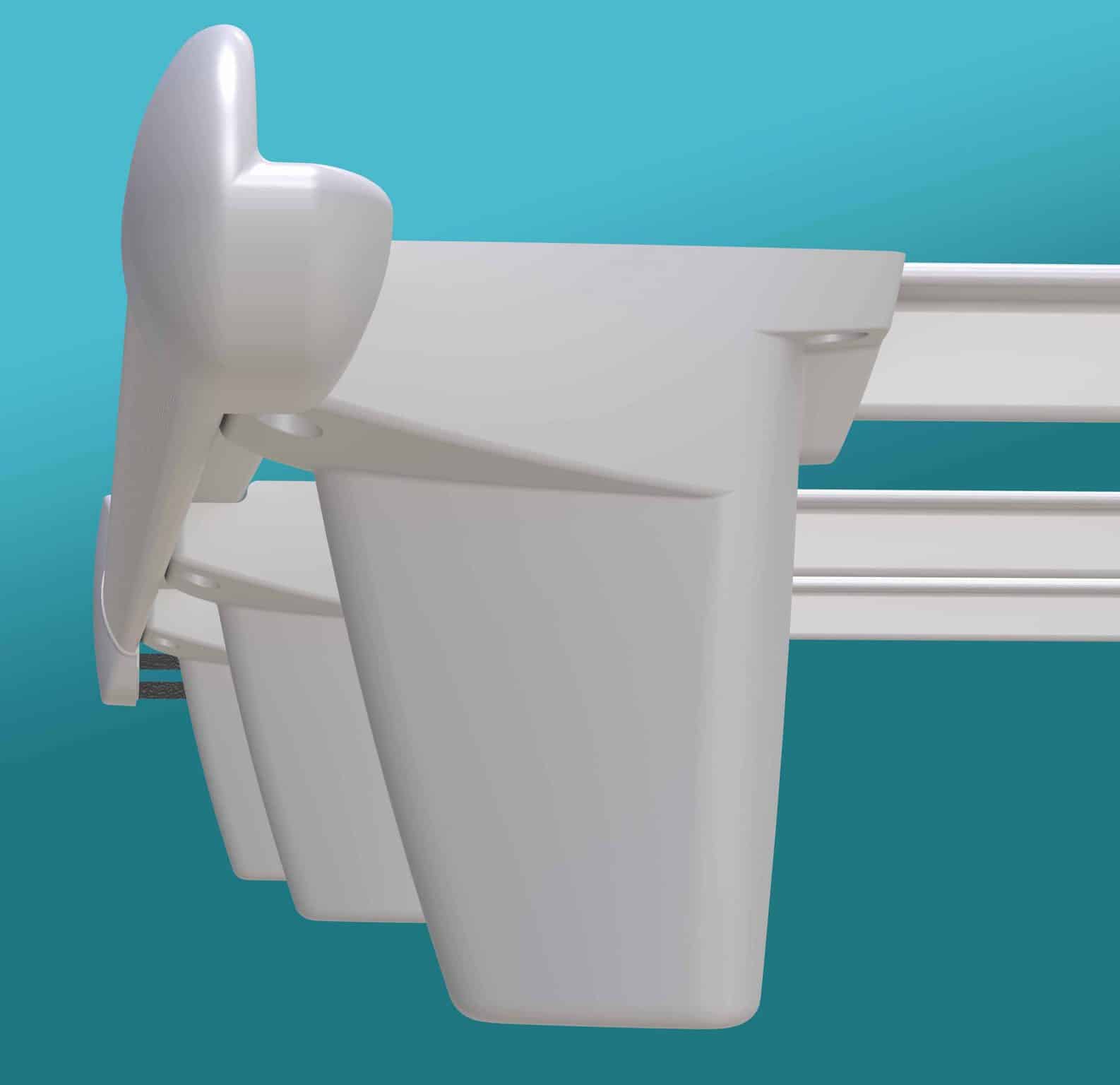
Contemporary: Knickerbocker in Carlstadt, N.J., has launched emBrace, a composite, resin-encased frame that assembles in seconds.
Steel bedding support systems have long hidden below headboards, behind footboards and beneath dust ruffles.
Except for perhaps the occasional squeak, the metal parts that keep bed sets lifted off the floor have settled for being barely noticed by consumers and even retailers. That may be changing.
BedTimes spoke with manufacturers and distributors of the hidden hardware beneath stationary beds to find out what’s up down there. These companies supply an array of metal components to mattress manufacturers and retailers, but the products we focus on here are bed frames to which a headboard may be attached, bed rails that link headboard to footboard, bed bases—popular in hospitality settings because they keep items from rolling under the bed—and supplemental support systems that are added to an existing frame or all-wood bedroom set.
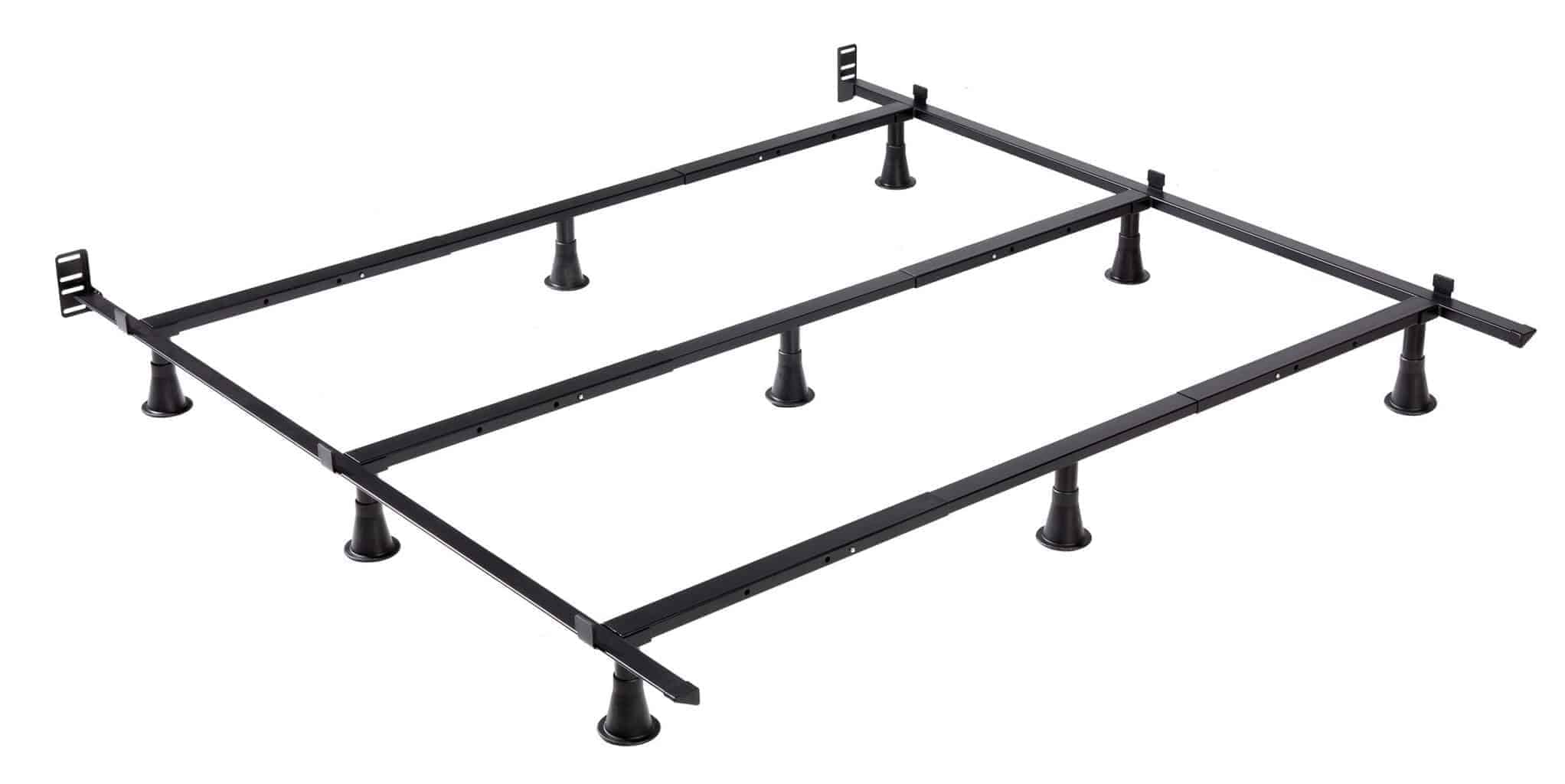
Understated strength: Leggett & Platt’s Consumer Products Group in Whittier, Calif., has launched the premium Prestige frame with triangular side rails, oversized recessed glides, pushpin assembly and a jet-black finish.
When BedTimes last presented an in-depth report on such products in 2006, suppliers were focused on educating retailers about the need for supplemental support beneath inexpensive, imported bedroom sets. That message seems to have been absorbed by retailers and furniture manufacturers. Today, frame makers are vying to entice consumers with step-up support for higher-end bedding.
The standard brown angle iron promotional bed frame continues to abound at retail. But there are new colors, a broad selection of looks and price points in wheels and glides, and even some different rail profiles.
Giveaways going away
The idea of a giveaway promotional frame with bed purchase is gradually disappearing, most suppliers agree. Post-recession, many retailers are focused more on selling frames—and selling better frames—and that’s spurring product and marketing innovations among producers.
“Before 2008, when times were good, retailers could afford to give away an inexpensive frame that might retail for between $30 and $60,” says Herman Tam, group vice president of marketing for Leggett & Platt’s Consumer Products Group in Whittier, Calif., the largest supplier of frames and support systems in North America.
Today, it’s far more likely that a retailer will offer a choice: a free promotional frame, free mattress delivery or free takeaway of a used mattress—but not all three, says Ron Fredman, executive vice president of Glideaway Bed Carriage Co. in St. Louis.
“Frames are being sold—not given away—partly because of inflationary pressures on steel prices,” says Brent Polunsky, bedding support sales manager for El Paso, Texas-based W. Silver Products, a vertically integrated company that produces its own angle iron in an ISO 9001-certified factory.
“With mattresses heavier—and people heavier—it’s especially important today for retailers to get the consumer to spend the extra money for extra support,” Polunsky says.
W. Silver is filling out its lineup of support systems. In October, it introduced the premium Silver-Lock frame, which has a “wedge-type” rail, an oversized headboard bracket and new leg design.
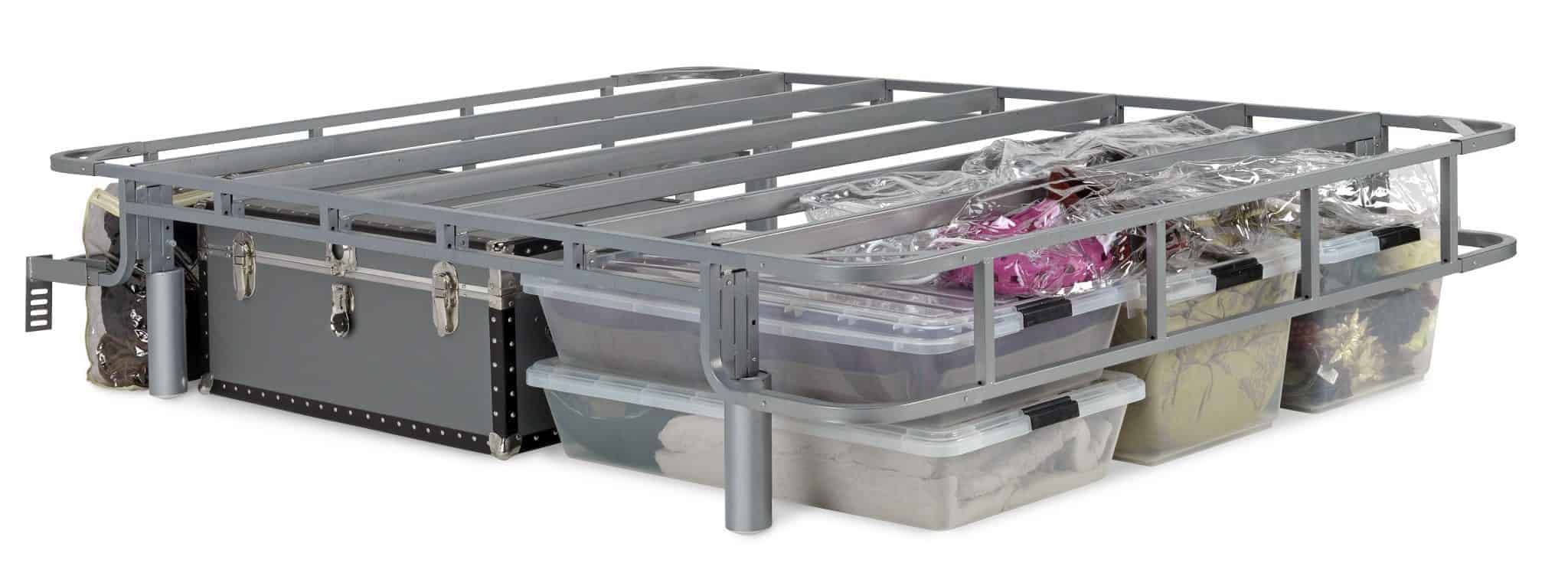
Store your stuff: Forever Foundations LLC in Orange, Calif., imports a collection of tubular steel platform foundations that provide a 14-inch high storage space underneath.
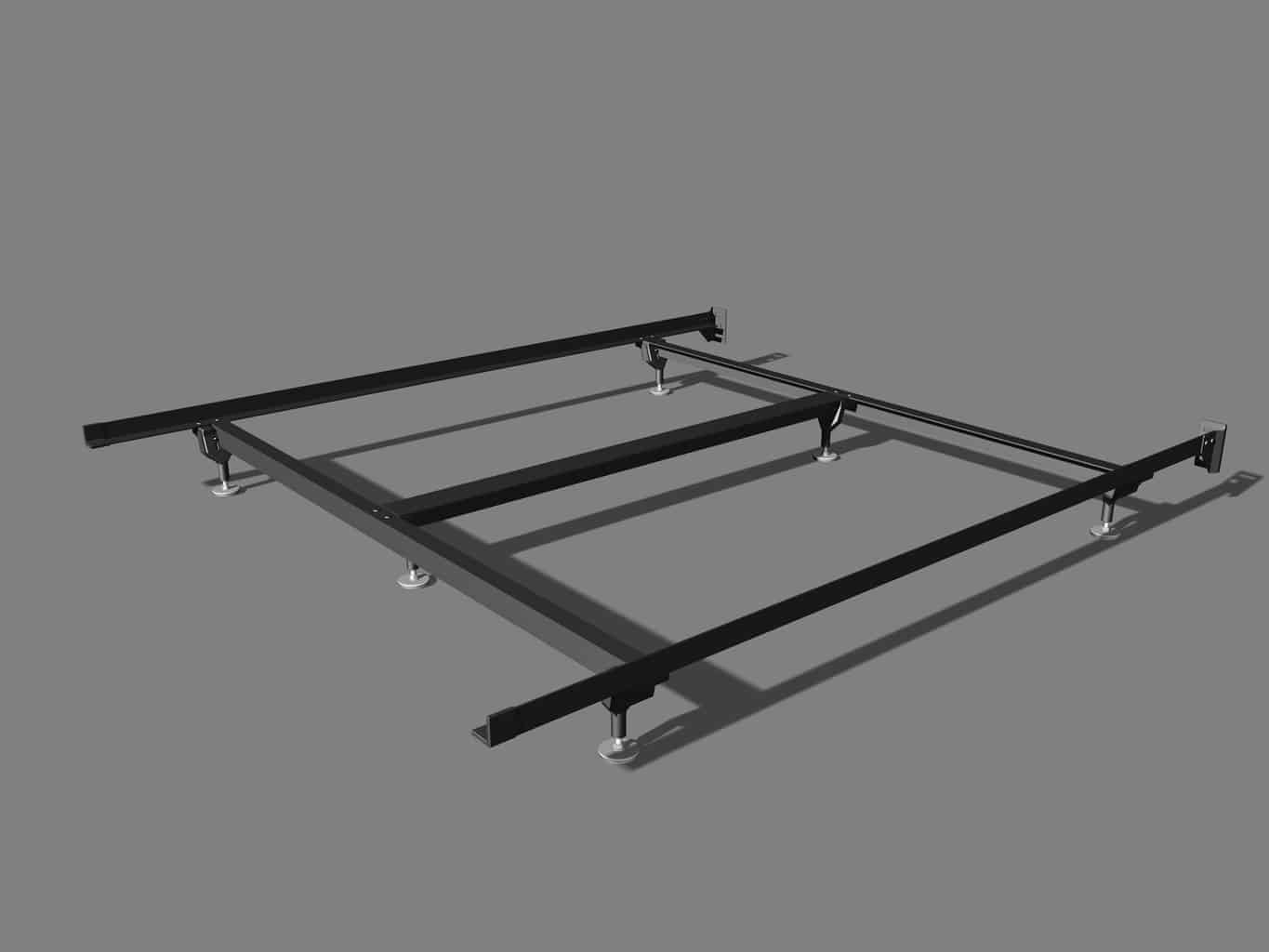
Super strong: Mantua Mfg. Co. in Walton Hills, Ohio, offers a top-of-the-line bed frame with 1 ¾-inch rails.
Framing the sale
The focus on selling bed frames varies from retailer to retailer, with some placing much greater emphasis on upselling shoppers to better frames. Suppliers say they have put considerable effort into educating retailers about how to sell better frames.
“We do see a lot of cost-driven retailers, which is why we have something for everyone, from inexpensive $30 frames up to $199,” Tam says. “There are thousands of SKUs, including frames, rails, supports and other hardware.”
An emphasis on sales training is part of the Leggett & Platt Retail Solution program for mattress retailers. L&P also supplies an array of point-of-purchase information for consumers.
Whatever a retailer’s philosophy about selling frames and supports, presenting a “good-better-best” choice will increase the likelihood of making the sale, Tam says.
A typical three-step collection of frames from L&P might range from the promotional Restmore series to the mid-priced Inst-A-Matic (which retails for approximately $100 in queen size and is the company’s most popular “better” frame) to the Edge premium frame with a tubular design.
Niles Cornelius, general manager of Hickory at Home in Hickory, N.C., is another proponent of a good-better-best merchandising strategy.
“We find that major sleep shop chains who master the art of step-up mattress sales are quite successful at selling ‘better’ bed frames, too,” Cornelius says. Hickory distributes a line of good-better-best support systems manufactured by Mantua Mfg. Co., including Insta-Lock bed frames and the Strong Arm brand of center support systems.
“Often for about a $20 premium, you can purchase a ‘better’ frame with your new bed and for about $50 more, you can get the very best,” Cornelius says. “On the other hand, many furniture stores only stock inexpensive frames and are missing out on an opportunity. They are not really focusing on the support under the bed as they should be.”
“Some retailers tell us they have no problem selling a step-up frame when the consumer is spending $1,000 to $2,000 on a bed set,” says David Jaffee, president of Mantua, which has headquarters in Walton Hills, Ohio. “People understand they are protecting their investment by purchasing a good frame.”
“But,” Jaffee continues, “it takes a certain level of commitment to sell a step-up frame and you must be willing to train your RSAs. Oddly, sometimes low-cost retailers are all about it and high-end retailers can’t be bothered. Those retailers who have focused on frames and supports have been incredibly successful with them.”
Mantua has four U.S. manufacturing plants for frames and supports. About 70% of the products it sells are made in the United States from recycled rail steel. Mantua’s bed frame line includes a “good” and “better” Insta-Lock series with 1 ¼-inch rails or 1 ½-inch rails. It also offers a heavy-duty, premium Craftlock bed frame with 1 ¾-inch rails.
Glideaway offers four grades of frames—from promotional to ultra-premium—in addition to other specialized premium products, all of which are made in the United States, Fredman says. The company recently introduced a POP display unit that showcases as many as five miniature versions of its steel bed frames and support systems, plus brochures detailing product information.
“Once customers can see and feel the difference between the 1 ¼-inch by 1 ¼-inch side rails in the promotional line and the 1 ¾-inch by 1 3/8-inch ribbed side rails of the ultra-premium line, the cost difference can be better justified,” Fredman says.
Glideaway’s ECO frame, which is packaged in recycled cardboard, enhances and illustrates the frame’s sustainability story for consumers. It launched in August and is a hit with “green” retailers, Fredman says. Boyd Specialty Sleep, a mattress maker and furniture distributor based in St. Louis, has created a series of short videos that explain how to assemble its collection of imported platform-style steel foundation frames. While shopping, consumers can scan a quick response, or QR, tag on the product box and watch the video of the frame’s easy assembly on their smart phone.
Several support system makers say they supply e-commerce sites. Some report that Internet sales have jumped, but mostly in the promotional category.
“We are seeing much more Internet activity, but it’s amazingly competitive,” Jaffee says. “Most e-commerce companies are great at selling products off the shelf, but they’re basically in the technology business, not the sleep products business. It’s a little harder for them to execute a step-up program.”
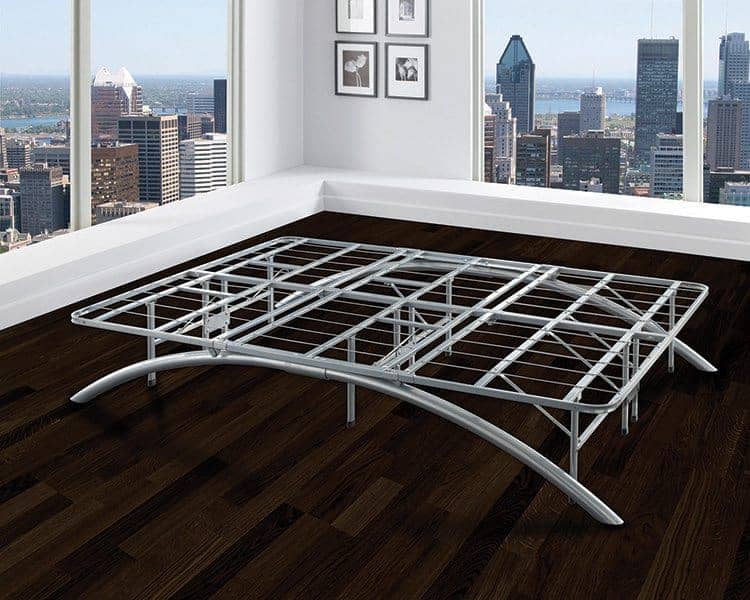
Stylish platform: Boyd Specialty Sleep in St. Louis offers a line of metal platform frames, some with decorative elements such as this one with arched legs.
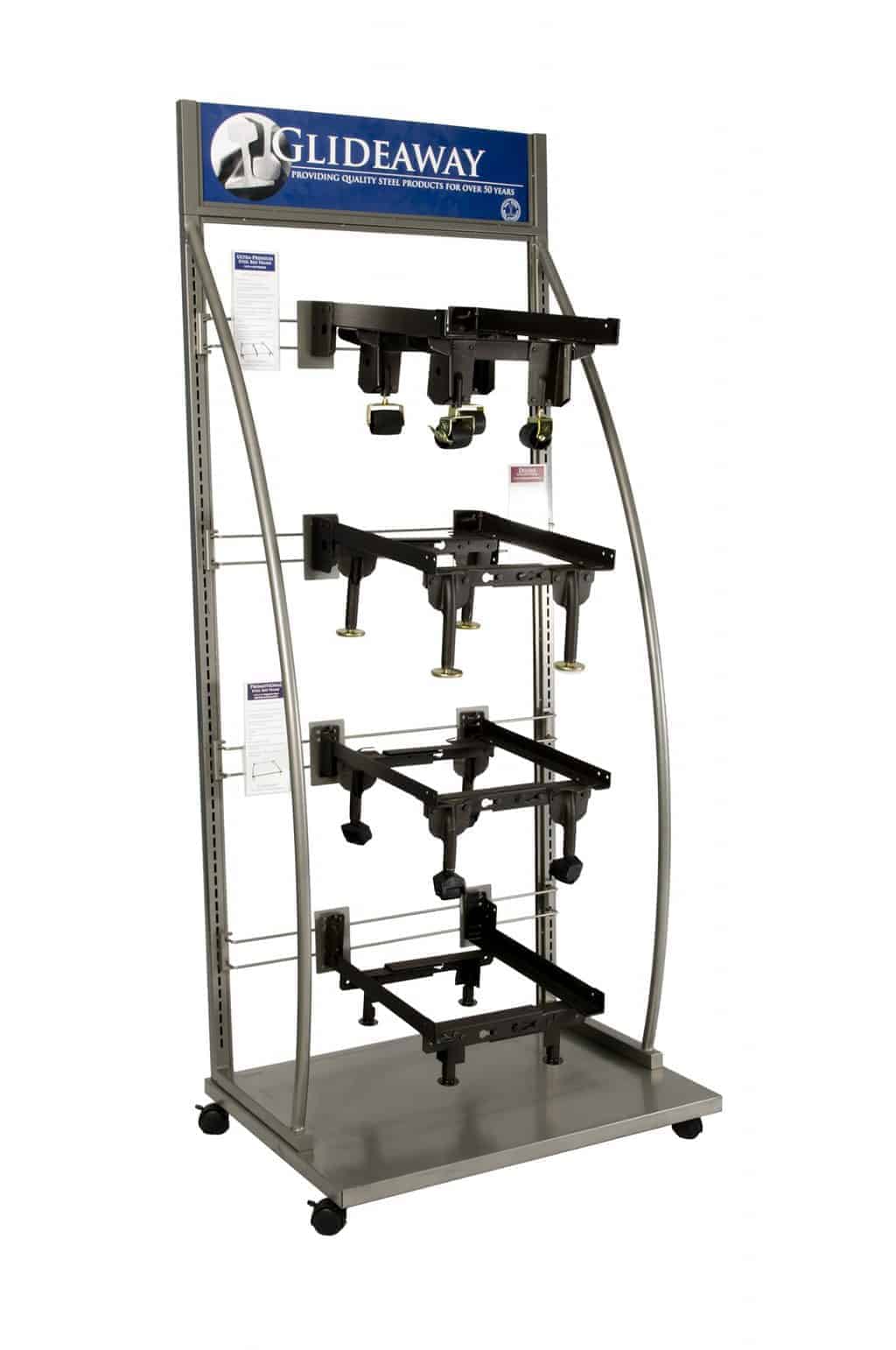
Glideaway Bed Carriage Co. in St. Louis makes step-up sales a cinch with a display unit for as many as five miniature bed frames.
Latest features
With giveaways no longer a given, manufacturers say there is a greater a demand from retailers for innovation in under-the-bed hardware.
While the L&P angle iron Inst-A-Matic frame remains a “volume seller,” in 2008 the company launched what it says was the industry’s first stylish, tubular steel frame, the Edge. It has a satin silver finish, round legs and locking rug-roller wheels.
“You build in features and benefits that retailers can use to make the sale,” Tam says. “We spoke to consumers and discovered some want something special, not just functionally good, but something better looking.” At the recent Las Vegas Market, L&P introduced a “best of the best” bed frame, the Prestige. Features include tubular steel rails, extra-large recessed glides and pushpin assembly. The frame adjusts to any bed size. Although it’s finished in a sleek, high-gloss jet black, it’s designed to be mostly hidden from view.
Both the Edge and Prestige have suggested retail prices in the $179 to $199 range.
“The bed frame is not the lead actor—it’s a highly functional product that we are making a little more sexy to capture the consumer’s attention in the store,” Tam says. “You want the frame to say, ‘Buy me now!’ But when they get it home, most consumers don’t want to showcase the bed frame. That’s the design balance we’re trying to strike.”
In addition to its full line of Bed Architecture—sturdy bed frames with center supports and supplemental center support systems, including the Bedbeam series— Knickerbocker now offers the emBrace frame.
“Your bed feels better and performs better on an emBrace,” says Richard Polevoy, president of the Carlstadt, N.J.-based company. “It supports 2,000 pounds without deflection and no ‘creep.’ ” The frame has seven patents issued or pending, including one for a T-section side rail.
“With emBrace, we’ve developed a new product and new branding and are reinventing the category,” Polevoy says. “With a combination of form and function, this does not look like hardware. It looks like a piece of furniture and is the strongest bed frame that’s ever been designed.”
The angle iron frame is encased in a smooth, rounded composite resin that comes in black, white, gray and brown. The emBrace retails for about $299 in queen size. Once unboxed, the frame assembles quickly, Polevoy says.
“Bedding keeps moving up in price, quality and feel,” Polevoy says. “We wanted to enhance the performance and look of a set of bedding and finish it properly.”
Glideaway recently introduced the premium T9 Series, which Fredman describes as a “cool-looking” universal frame that retails for $179 to $199 in queen. It has nine legs, new wheel styles and three cross supports.
“Retailers who already carry it are seeing a 50% attachment rate with queens and 60% with king beds,” Fredman says. “With consumers spending $200 for a pillow, upselling them to a $200 frame with a bit of a ‘wow’ factor is not such a big deal.”
While rainbow colors don’t exactly dominate this product segment—in fact, most are finished in neutral or metallic hues—L&P has a powder-coat facility capable of producing frames in virtually any color, Tam says. Another design trend: Wheeled legs are giving way to glides, which are more stationary but still allow a bed to be moved across hardwood floors or rugs, Tam says.
“We encourage people to go with glides and there is a definite trend toward them,” Jaffee says. “Glides are incrementally stronger, less expensive and, if you look at how vacuum cleaners are engineered today, there’s less need to be able to move the bed to clean under it.”
Urban dwellers and a trend toward smaller houses have led to increased interest in under-bed storage.
“Under-bed storage is a really big thing now and we are focusing on that,” Jaffee says. “We’re finding that more folks are buying bed bases for the home—it’s not just a hospitality sale anymore. In addition to storage, consumers like that nothing can roll under the bed.”
At the winter Las Vegas Market, Mantua’s major launch was a new bed base. It’s available in three neutral finishes with a large storage drawer at the foot of the bed.
Step up to steel foundations
The lines appear to be blurring between support systems and foundations.
Three years ago, L&P introduced the Out of the Box Foundation, a “box spring” with flexion, fabric cover and detachable legs. The unit folds in half for easy shipping and is designed for e-commerce sales and easier deliveries to apartment dwellers.
The trend toward thick, one-sided mattresses sold with no-flex or low-flex wood foundations has paved the way for acceptance of the steel platform bed frame, which takes the place of both foundation and bed frame. Most of these steel platform frames knock down for easy shipping. The product first appeared in North America about five years ago as an import from China. The bases vary in quality and strength and are imported by a number of companies.
Boyd Specialty Sleep offers a collection of all-metal platform bases that have suggested retails from $99 to $199 in queen size. The foundations offer superior strength and support, says President Dennis Boyd.
“The steel supports are significantly stronger than any spaced pine framing used on an all-wood foundation. I don’t see many foundation suppliers advertising that their product can support 2,500 pounds,” he says.
“In container quantities, the queen platform base lands for about $50—this is approximately the same price or less than a retailer pays for a foundation,” Boyd says. “In addition, the mattress would then need a metal bed frame, usually $30 to $50. A platform frame is both less expensive and more durable and does not bend, squeak, warp or break. They can be transported in a car, fit easily in an elevator and go up virtually any stairway.” Boyd’s higher-priced metal foundations incorporate decorative elements.
Forever Foundations LLC, based in Orange, Calif., imports a collection of Forever brand tubular steel platform foundations from China. Key benefits are durability, easy assembly and under-bed storage, the company says. The foundations, including the Forever Storage bed base with tilt-up access, provide a 14-inch high storage space beneath the bed.
“They’re made of 80% recycled tubular steel in 16 gauge,” says Mike Echevarria, Forever Foundations national director of sales and marketing. “The top has support bars and a taut trampoline-material cover. Our customers range from mom-and-pop stores to major sleep shop chains.”
Reroll steel mills go beyond ‘green’
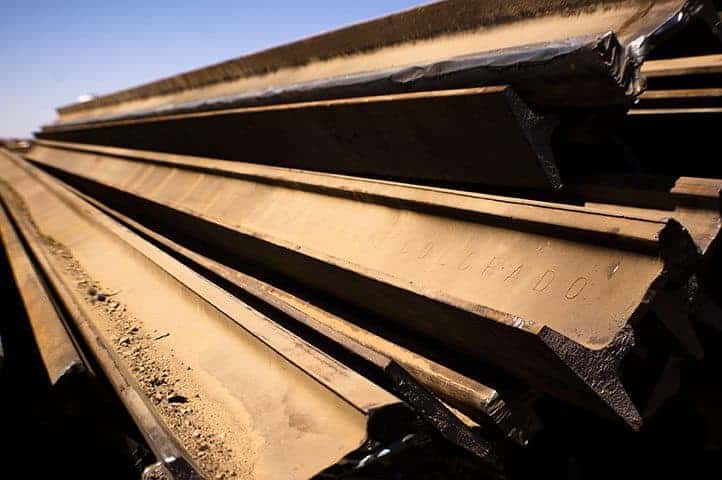
Sustainable steel: W. Silver Inc. in El Paso, Texas, processes recycled rail steel at its energy-efficient reroll mill.
Most bed frames and support systems manufactured in the United States are made from recycled rail steel.
The story behind the use of such steel in bed frames is a powerful one to tell consumers, says Ron Fredman, executive vice president of Glideaway Bed Carriage Co. in St. Louis.
“Rail steel is known for its exceptional strength. Consider that rail steel has spent years being crushed—impacted by 250,000 tons on a regular basis,” he says. “When you turn that rail steel into a bed frame, you get resiliency. Take a sledge hammer to a bed frame, it’s not going to bend.”
W. Silver Inc., based in El Paso, Texas, is a 43-year-old steel mill that supplies W. Silver Products, as well as other bedding hardware producers and industry sectors, with rerolled rail steel. The company takes being “green” seriously. It has a number of sustainability initiatives in place that reduce, reuse and recycle throughout the manufacturing process. Sister company W. Silver Recycling, in business for 90 years, is nearby to process and recycle metals, including used machinery blades, as well as plastics, paper, cardboard, electronics waste and more.
Mattress industry supplier Jersey Shore Steel, based in Jersey Shore, Pa., also takes environmental sustainability seriously.
In 2001, Jersey Shore began heating one of its furnace zones with methane gas piped in from the local landfill. By 2006, it had converted all six furnace zones to landfill gas.
In addition to burning methane, the mill’s energy-efficient recuperative furnace captures exhaust gas and recirculates it, reducing the need for air preheaters. The company has converted more than 100 motors that drive water pumps, compressors and other mill equipment to electricity-saving, variable-frequency drives. The company recycles scrap and waste throughout its plant and has installed energy-efficient lighting.
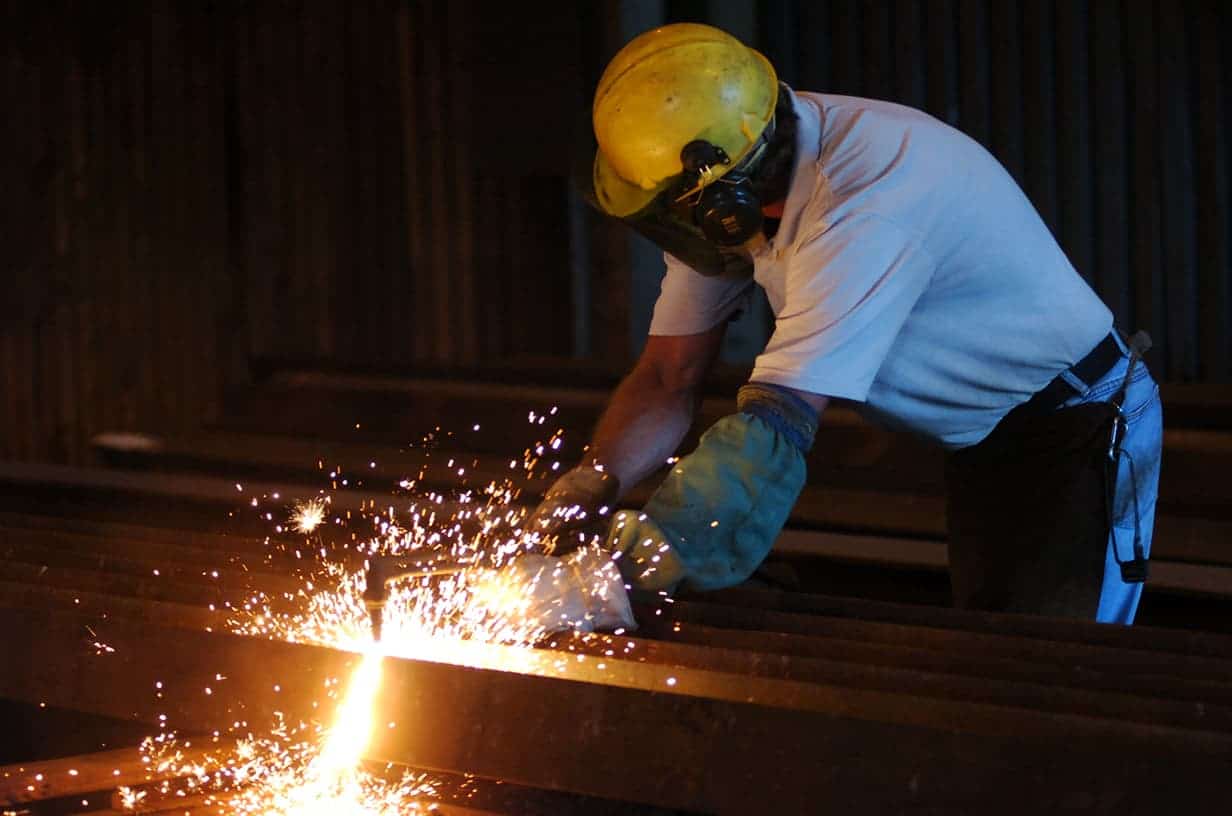
Negative carbon footprint: Jersey Shore Steel in Jersey Shore, Pa., powers its furnaces with methane from the local landfill. (Photo by Mark Nance, Williamsport Sun-Gazette, used by permission. Photo copyright Williamsport Sun-Gazette.)
“We were very aggressive and ahead of the curve in following this environmentally friendly path,” says Marshall Welch, Jersey Shore president and chief executive officer. “The whole point of the sustainability movement is that it makes dollars and sense when managed properly. We were consuming a lot of electricity and natural gas before getting to where we are today.”
In fact, according to Pennsylvania State University researchers who conducted an assessment in 2011, Jersey Shore Steel’s environmental impacts are so low, the company has what amounts to a negative carbon footprint.




